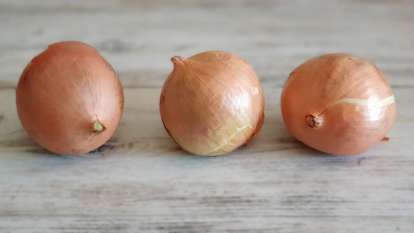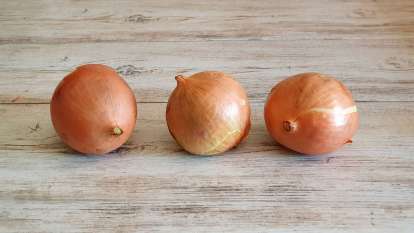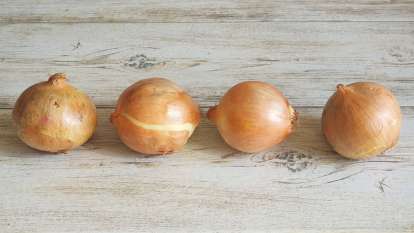Yellow onion
Yellow onion and its benefits
The medicinal qualities of onion have been recognized since ancient times, when they were used to treat diseases such as headaches, heart disease and oral conditions. Yellow onion is effective as an antioxidant, relieves menopausal symptoms and helps fight heart disease.
Although all vegetables are important for health, certain foods offer unique benefits. Onion is part of the Allium group, which includes garlic, leeks and chives. The best known variety of onion is yellow onion. This assortment is the most used in cooking, being a common ingredient for countless recipes.
A real treasure for the body, onion contains vitamins, minerals and various essential elements, which have beneficial effects on adults and children. Farmers have been cultivating onion for centuries. According to the Food and Agriculture Organization of the United Nations, China is the world’s largest producer of onion.
Nutritional values of yellow onion (100g)
- Vitamin B3 (Niacin): 0,116 mg (1% RDD)
- Vitamin B5 (Pantothenic acid): 0,123 mg (2,5% RDD)
- Vitamin B6 (Pyridoxine): 0,120 mg (9% RDD)
- Vitamin B2 (Riboflavin): 0,027 mg (2% RDD)
- Vitamin B1 (Thiamine): 0,046 mg (4% RDD)
- Vitamin A: 2 UI (0% RDD)
- Vitamin C: 7,4 mg (12% RDD)
- Calcium: 23 mg (2% RDD)
- Iron: 0,21 mg (3% RDD)
- Magnesium: 10 mg (2,5% RDD)
- Manganese: 0,129 mg (5,5% RDD)
- Zinc: 0,17 mg (1,5% RDD)
- Phosphorus: 29 mg (4% RDD)
- Copper: 0,039 (4% RDD)
Benefits of yellow onion
Onion is rich in nutrients, vitamins and minerals, but is low in calories. An average onion provides only 44 calories, but is full of vitamins, minerals and fiber. This vegetable contains a huge amount of vitamin C, effective for strengthening immune health, collagen production and iron absorption.
Vitamin C acts directly as an antioxidant, protecting your cells from free radical problems. Yellow onion is also rich in B vitamins, which stimulates metabolism, red blood cell production and the nervous system, it is a source of potassium and magnesium. Onion contains antioxidants and compounds that fight against inflammation, lower triglyceride levels and reduce cholesterol, as well as the risk of heart attack.
Quercetin is a flavonoid antioxidant contained by yellow onion. Because it is a powerful anti-inflammatory, it can act to lower blood pressure. A study of overweight people with high blood pressure showed that a dose of 162 mg per day of onion extract significantly reduced systolic blood pressure by 3-6 mmHg compared to placebo.
In addition, evidence from animal studies suggests that eating onion may reduce risk factors for heart disease, including inflammation, high triglyceride levels and blood clots. Research shows that eating onion can help reduce the risk factors for heart disease, such as high blood pressure, high triglyceride levels and inflammation.
Onion is an excellent source of antioxidants. Yellow onion contains over 25 different types of antioxidants. Antioxidants are compounds that inhibit the process that leads to cell damage and encourage various diseases such as cancer, diabetes and heart disease. Research has shown that people who eat more food rich in anthocyanins (such as onion) have a reduced risk of heart disease.
Onion helps relieve the manifestations of menopause
Women at menopause showed an improvement in bone density following several cures with onion juice for two months. Clinical studies have shown that older women who regularly consume onion are less prone to hip dysplasia and have 5% higher bone density than people who do not consume yellow onion.
Yellow onion helps reduce oxidative stress, increases antioxidant levels and decreases bone loss, prevents osteoporosis and increases bone density. Although dairy products are known to have high amounts of calcium, certain vegetables, more specifically onion, can help create a strong bone system.
Onion has antibacterial properties
Onion fights against dangerous bacteria – E.coli, Staphylococcus aureus or Bacillus cereus. Quercetin extracted from onion helps the body in the fight with bacteria. A clinical study has shown that quercetin extracted from onion successfully inhibited the development of Helicobacter pylori (H. pylori) and Staphylococcus aureus.
Contraindications and side effects of yellow onion
You should be careful when consuming yellow onion if:- you have a high stomach acidity;
- you suffer from liver and kidney disease;
- you suffer from gastritis, ulcer or asthma.
Did you know that onion…?
- it was cultivated and consumed frequently in ancient Egypt. Onion was part of the food that the slaves who built the pyramids were fed, for their beneficial effects;
- it was offered to gladiators, in ancient Rome, for extra strength and firm muscles;
- helps to fight insects. Onion is used to prevent insect bites;
- hashma or French onion has more garlic flavor and smell than onion;
- it is toxic for dogs. Onion destroys red blood cells in dogs’ blood and, if consumed in large quantities, can lead to dangerous anemia, so avoid letting the dog eat onion.



Comments